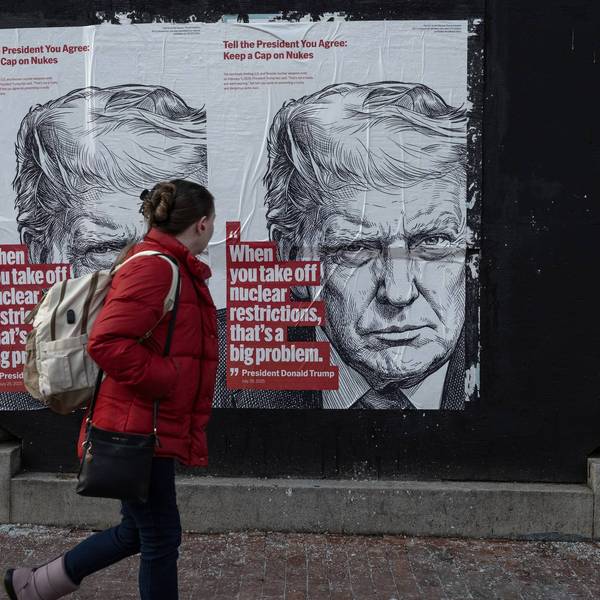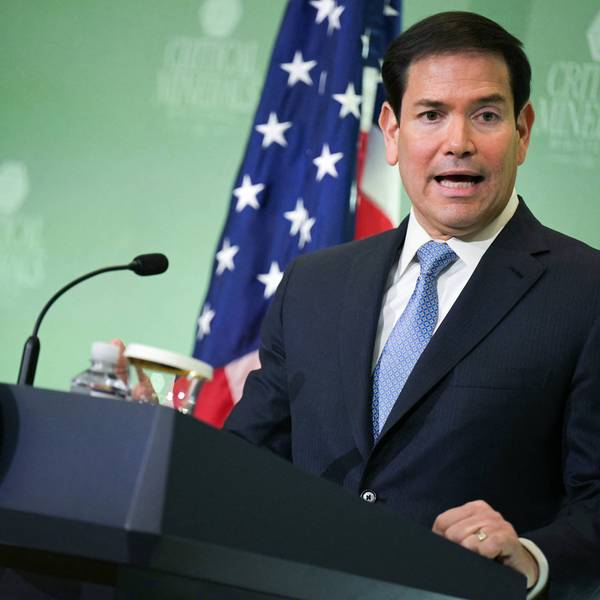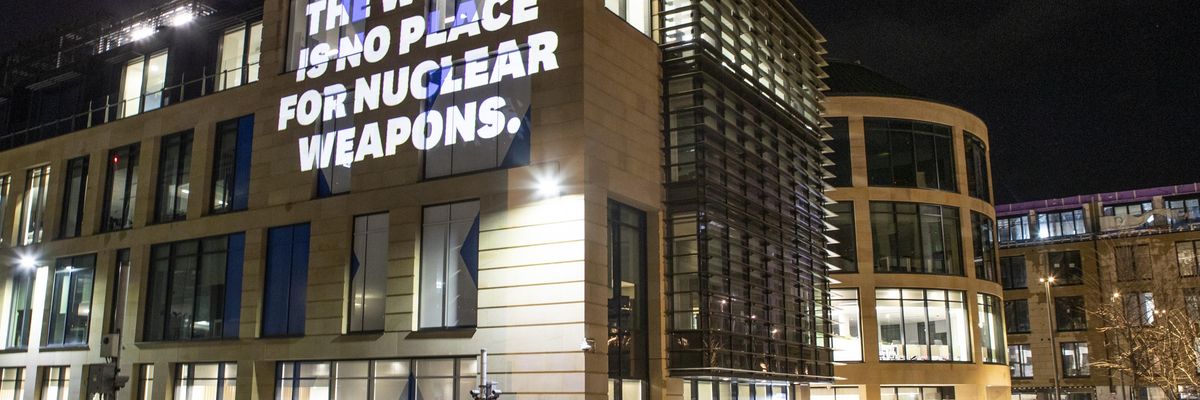January 22 marks the second anniversary of the U.N. Treaty on the Prohibition of Nuclear Weapons, a global lifeboat supported by 70% of the world's countries. Meanwhile, the U.S. Department of Energy's 2023 budget request for nuclear weapons' upgrade is more than $21 billion and close to $8 billion for radioactive and chemical cleanup at nuclear weapon sites across the country. Stack this up against the same department's 2023 budget for energy efficiency and renewable energy—$4 billion—and we see the future: weapons trump wind turbines; war worsens climate crisis.
Moreover, the government's budget has no line items for the massive existential costs of nuclear weapons, three of which are described here:
- the dread that world-ending nuclear bombs provoke in humans (unless we have become "numb to… that culture of mass death");
- the "forever" radioactive contamination that eludes cleanup to human and environmental safety standards, the estimated cost of just one site, Hanford, Washington, being $300 billion to $640 billion; and
- the theft and poisoning of Indigenous peoples' lands and culture for mining uranium, generating bomb-grade plutonium, and conducting above-ground atomic bomb testing.
Hanford, Washington is the site of the largest plutonium-production reactors in the world from 1944 to 1987 (including for the bomb dropped on Nagasaki). The Hanford land, bordering the Columbia River, was effectively stolen from four Indigenous tribes and peasant farmers by the federal government and is now "arguably the most contaminated place on the planet," according to Joshua Frank, author of Atomic Days.
The Hanford plutonium-making site has killed and contaminated fish, waterfowl, and other biological life in the Columbia River and polluted 200 square miles of the aquifer beneath. It contains 177 leaky underground storage tanks holding 53 million gallons of radioactive and chemically hazardous waste—an atomic wasteland that may never be remediated. The worst and very-real scenario for this site and its workers is a Chernobyl-like explosion from leaking hydrogen gas.
While nuclear weapons governments and their bomb-making industries are criminally sleepwalking into what could mean the end of our planet's life, many others—scientists, high-level military, citizens, and whole countries—are countering the weapons holders' political idiocy with principled intelligence.
- At their 40th reunion in Los Alamos, New Mexico, 70 of 110 physicists who worked on the atomic bomb signed a statement supporting nuclear disarmament. When have the brightest scientists of their day ever admitted that their most notable work was a colossal mistake?
- On February 2, 1998 retired General George Butler, former commander of U.S. Strategic Air Command, addressed the National Press Club: "The likely consequences of nuclear weapons have no... justification. They hold in their sway not just the fate of nations but the very meaning of civilization." Sixty other retired generals and admirals joined him in calling for nuclear weapons abolition.
- Against immense pressure from nuclear-armed states, most aggressively the United States, 122 countries agreed in July 2017 to ban nuclear weapons. At the heart of the United Nations Treaty on the Prohibition of Nuclear Weapons (TPNW) is an explicit ethical goal: to protect the world’s peoples from the humanitarian catastrophe that would ensue were nuclear weapons employed.
- By the end of 2022, 68 countries ratified the treaty and 23 more are in the process.
- At least 30 more countries have promised to join the treaty.
- Since 2007, ICAN, an international organization with partners in over 100 countries, has mobilized people throughout the world to convince their governments to support a ban on nuclear weapons.
- Mayors for Peace from over 8,000 global cities call for the abolition of nuclear weapons.
The new U.N. treaty prohibiting nuclear weapons bolsters the hope that the United States and the eight other nuclear giants will grow up into pragmatic, if not ethical, adult governments and eliminate forever their genocidal weapons. One nation did so: South Africa developed nuclear weapons capability and then voluntarily dismantled its entire program in 1989.
The Road Less Taken
In 1963, President John Kennedy gave at American University's commencement what has been deemed the most important speech by a U.S. president—a speech on peace with the Soviet Union. But "what about the Russians?" everyone asked. Kennedy responded: "What about us… Our attitude [toward peace] is as essential as theirs." According to historian Jim Douglass, "John Kennedy's strategy of peace penetrated the Soviet government's defenses far more effectively than any missile could have done." Promoted across the Soviet Union, Kennedy's speech and his behind-the-scenes diplomacy with Nikita Khrushchev led toward defusing Cold War tension and planted the seed of a world without nuclear weapons and war. This seed awaits germination.
If the U.S. could once again replace its masculinist power with creative foreign policy and reach out to Russia and China with the purpose of dismantling nuclear weapons and ending war, life on Earth would have a heightened chance.




